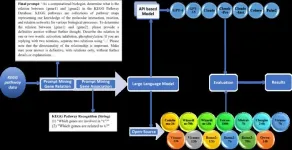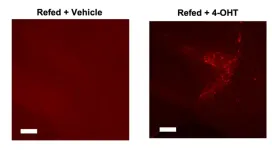(Press-News.org) Switching from a diet high in saturated animal fats to one rich in plant-based unsaturated fats affects the fat composition in the blood, which in turn influences long-term disease risk. A recent study published in Nature Medicine, conducted by a team of researchers from Chalmers University of Technology, Sweden, the German Institute of Human Nutrition, Germany and several other universities, shows that it is possible to accurately measure diet-related fat changes in the blood and directly link them to the risk of developing cardiovascular disease and type 2 diabetes.
“Our study confirms with even more certainty the health benefits of a diet high in unsaturated plant fats such as the Mediterranean diet and could help provide targeted dietary advice to those who would benefit most from changing their eating habits”, says Clemens Wittenbecher, research leader at Chalmers University of Technology and the study’s senior author.
The World Health Organisation (WHO) highlights the importance of healthy diets in preventing chronic diseases, recommending the replacement of saturated fats with plant-based unsaturated fats to reduce cardiometabolic risk. However, the certainty of these guidelines is moderate due to limitations in existing studies.
This new study addresses these limitations by closely analysing fats in the blood, also known as lipids, with a method called lipidomics. These very detailed lipid measurements enabled the researchers to link diet and disease in an innovative combination of different study types. This novel approach combines dietary intervention studies (that use highly controlled diets), with previously carried out cohort studies with long-term health tracking.
Diet trials to monitor how changes in food consumption affect blood fat
Part of this research was conducted in a dietary intervention study at the University of Reading, U.K., which involved 113 participants. For 16 weeks, one group consumed a diet high in saturated animal fats, while the other group followed a diet rich in unsaturated plant-based fats. Blood samples were analysed using lipidomics to identify specific lipid molecules reflecting the different diets each participant consumed.
"We summarised the effects on blood lipids with a multi-lipid score (MLS). A high MLS indicates a healthy blood fat profile, and a high intake of unsaturated plant fat and low intake of saturated animal fat can help achieving such positive MLS levels”, says Fabian Eichelmann from the German Institute of Human Nutrition Potsdam-Rehbruecke and first author of the study.
These MLS results from the dietary intervention study were then statistically related to the occurrence of cardiovascular disease and type 2 diabetes in large observational studies that had previously been carried out. These large cohort studies followed initially healthy participants for several years. This analysis of data from both sets of studies showed that participants with a higher MLS, which indicates a beneficial dietary fat composition, had a substantially reduced risk of developing cardiometabolic diseases.
Switching to a healthier diet, can have the most pronounced health benefits
Additionally, the study examined whether individuals with low MLS levels, indicating high saturated fat content of the diet, specifically benefited from a healthier diet. The Mediterranean diet focuses on providing more unsaturated plant fats and was used in one of the large intervention trials, known as the PREDIMED trial. Using this study, the researchers found that diabetes prevention was indeed most pronounced in individuals with low MLS levels at the start of the study.
“Diet is so complex that it is often difficult to draw conclusive evidence from a single study. Our approach of using lipidomics to combine intervention studies with highly controlled diets and prospective cohort studies with long-term health tracking can overcome current limitations in nutrition research,” explains Clemens Wittenbecher.
About the previous large cohort and intervention studies:
1. German EPIC-Potsdam study – Nordic diet, Mediterranean diet, and the risk of chronic diseases: the EPIC-Potsdam study
2. Harvard's Nurses’ Health Studies – The Nurses’ Health Study and Nurses’ Health Study II are among the largest investigations into the risk factors for major chronic diseases in women
3. PREDIMED trial – Primary Prevention of Cardiovascular Disease with a Mediterranean Diet Supplemented with Extra-Virgin Olive Oil or Nuts
More about the research:
The research is presented in the paper: “Lipidome changes due to improved dietary fat quality inform cardiometabolic risk reduction and precision nutrition.” published in the journal Nature Medicine.
The researchers involved in the study are Fabian Eichelmann, Marcela Prada, Laury Sellem, Kim G Jackson, Jordi Salas Salvadó, Cristina Razquin Burillo, Ramon Estruch, Michael Friedén, Frederik Rosqvist, Ulf Risérus, Kathryn M Rexrode, Marta Guasch-Ferré, Qi Sun, Walter C Willett, Miguel Angel Martinez-Gonzalez, Julie A Lovegrove, Frank B Hu, Matthias B Schulze, Clemens Wittenbecher
At the time of the study the researchers were active at:
German Institute of Human Nutrition Potsdam-Rehbruecke, Nuthetal, Germany
German Center for Diabetes Research (DZD), Neuherberg, Germany
Institute for Cardiovascular and Metabolic Research and Institute for Food, Nutrition, and Health, Reading, UK
Human Nutrition Unit, Department of Biochemistry and Biotechnology, Institut d'Investigació Sanitària Pere Virgili, Universitat Rovira i Virgili, Reus, Spain
Consorcio CIBER, M.P. Fisiopatología de la Obesidad y Nutrición (CIBERObn), Instituto de Salud Carlos III (ISCIII). Madrid, Spain
IdiSNA (Instituto de Investigación Sanitaria de Navarra), University of Navarra, Pamplona, Spain
Institut d’Investigacions Biomèdiques August Pi Sunyer (IDIBAPS), Hospital Clinic, University of Barcelona, Barcelona, Spain
Uppsala university, Uppsala, Sweden
Brigham and Women's Hospital, Boston MA, USA
University of Copenhagen, Copenhagen, Denmark.
Harvard T.H. Chan School of Public Health, Boston MA, USA
Institute of Nutritional Science, University of Potsdam, Nuthetal, Germany
Chalmers University of Technology, Gothenburg, Sweden
For more information, please contact:
Clemens Wittenbecher, Assistant Professor, Department of Life Sciences, Chalmers University of Technology, Sweden clemens.wittenbecher@chalmers.se +46 31 772 50 80
Fabian Eichelmann, Department of Molecular Epidemiology, German Institute of Human Nutrition Potsdam-Rehbruecke, Germany, fabian.eichelmann@dife.de
The contact persons both speak English and German. Clemens Wittenbecher also speaks Spanish. They are available for live and pre-recorded interviews. At Chalmers, we have podcast studios and broadcast filming equipment on site and would be able to assist a request for a television, radio or podcast interview.
END
Blood fat profiles confirm health benefits of replacing butter with high-quality plant oils
2024-07-11
ELSE PRESS RELEASES FROM THIS DATE:
Air pollution harms pollinators more than pests, study finds
2024-07-11
Bees and other beneficial bugs are disproportionately harmed by air pollution compared to crop-destroying pests, a new study published in Nature Communications has found.
Researchers from the University of Reading analysed data from 120 scientific papers to understand how 40 types of insects in 19 countries respond to air pollutants like ozone, nitrogen oxides, sulfur dioxide and particulate matter. Pollinators - including bees and some moths and butterflies - experienced a 39% decline in foraging ...
Aperiodic approximants for relating quasicrystals and modulated structures
2024-07-11
For a long time, scientists associated crystal structures with an ordered arrangement of atoms in a repeating lattice-like pattern, believing it to be the most stable configuration. However, by the 1960s, advancements in crystallography revealed materials that did not fit the traditional model. These structures exhibit a non-periodic or non-repeating pattern and are called aperiodic crystals.
There are two types of aperiodic crystals: quasicrystals (QCs), which exhibit ordered but aperiodic arrangements, and incommensurately (IC) modulated structures, where a three-dimensional periodic lattice structure ...
Hydrogen flight looks ready for take-off with new advances
2024-07-11
The possibility of hydrogen-powered flight means greater opportunities for fossil-free travel, and the technological advances to make this happen are moving fast. New studies from Chalmers University of Technology, in Sweden, show that almost all air travel within a 750-mile radius (1200 km) could be made with hydrogen-powered aircraft by 2045, and with a novel heat exchanger currently in development, this range could be even further.
“If everything falls into place, the commercialisation of hydrogen flight can go really fast now. As early as 2028, the first commercial hydrogen flights in Sweden could be in the air," says Tomas Grönstedt, Professor at Chalmers ...
Same workout, different weight loss: Signal molecule versions are key
2024-07-11
Some people lose weight slower than others after workouts, and a Kobe University research team found a reason. They studied what happens to mice that cannot produce signal molecules that respond specifically to short-term exercise and regulate the body’s energy metabolism. These mice consume less oxygen during workouts, burn less fat and are thus also more susceptible to gaining weight. Since the team found this connection also in humans, the newly gained knowledge of this mechanism might provide a pathway for treating obesity.
It is well known that exercise leads to the ...
Trained peers are as effective as clinical social workers in reducing opioid overdose, new trial finds
2024-07-11
In Rhode Island, USA, over one in four emergency department (ED) patients at high risk of overdose has a non-fatal opioid overdose in the 18 months post-discharge. A parallel, two-arm, randomized controlled trial conducted in Rhode Island of over 600 ED patients at high risk of opioid overdose found that support from a peer recovery support specialist (a trained support worker with lived experience of addiction) was as effective in reducing opioid overdose as support from a licensed clinical social worker. In other words, interviewing and intervention techniques informed by lived ...
Study: Algorithms used by universities to predict student success may be racially biased
2024-07-11
Washington, July 11, 2024—Predictive algorithms commonly used by colleges and universities to determine whether students will be successful may be racially biased against Black and Hispanic students, according to new research published today in AERA Open, a peer-reviewed journal of the American Educational Research Association. The study—conducted by Denisa Gándara (University of Texas at Austin), Hadis Anahideh (University of Illinois Chicago), Matthew Ison (Northern Illinois University), and Lorenzo Picchiarini (University of Illinois Chicago)—found ...
Comprehensive evaluation of large language models in mining gene relations and pathway knowledge
2024-07-11
Understanding complex biological pathways, such as gene-gene interactions and gene regulatory networks, is crucial for exploring disease mechanisms and advancing drug development. However, manual literature curation of these pathways cannot keep pace with the exponential growth of discoveries. Large-scale language models (LLMs) trained on extensive text corpora contain rich biological information and can be leveraged as a biological knowledge graph for pathway curation.
Recently, Quantitative Biology published a study titled "A Comprehensive ...
Researchers pinpoint brain cells that delay first bite of food
2024-07-11
LA JOLLA, CA—Do you grab a fork and take a first bite of cake, or say no and walk away? Our motivation to eat is driven by a complex web of cells in the brain that use signals from within the body, as well as sensory information about the food in front of us, to determine our behaviors. Now, Scripps Research scientists have identified a group of neurons in a small and understudied region of the brain—the parasubthalamic nucleus (PSTN)—that controls when an animal decides to take a first bite of food.
In the study, published in Molecular Psychiatry on July 4, 2024, the team of scientists set out to selectively manipulate a group of PSTN cells that dial up their ...
With spin centers, quantum computing takes a step forward
2024-07-11
RIVERSIDE, Calif. -- Quantum computing, which uses the laws of quantum mechanics, can solve pressing problems in a broad range of fields, from medicine to machine learning, that are too complex for classical computers. Quantum simulators are devices made of interacting quantum units that can be programmed to simulate complex models of the physical world. Scientists can then obtain information about these models, and, by extension, about the real world, by varying the interactions in a controlled way and measuring the resulting behavior of the quantum simulators.
In a paper published in Physical Review B, a UC Riverside-led research team ...
Scientists release new research on planted mangroves’ ability to store carbon
2024-07-11
U.S. Forest Service ecologists and partners published new findings on how planted mangroves can store up to 70% of carbon stock to that found in intact stands after only 20 years.
Researchers have long known that mangroves are superstars of carbon absorption and storage. But until now, limited information existed on how long it took for carbon stored in planted mangroves to reach levels found in intact mangroves.
“About ten years ago, Sahadev Sharma, then with the Institute of Pacific Islands Forestry, and I discovered that 20-year-old mangrove plantations in Cambodia had carbon stocks comparable to those of intact forests,” ...









